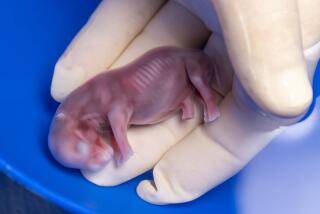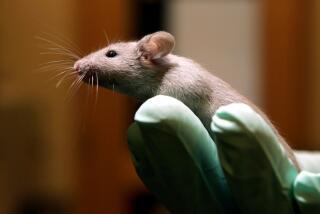Tests on Mice Lift Hopes for Uterus Transplants
- Share via
Mice with transplanted wombs have successfully carried to term and given birth to normal babies, Swedish doctors and scientists reported, boosting hopes that women who have had their uterus removed could receive a transplant and give birth to healthy children.
The births mark the first time an animal with a transplanted uterus has produced live offspring, Sahlgrenska University team leader Dr. Mats Brannstrom announced this week at a meeting of the European Society of Human Reproduction and Embryology in Madrid.
The uterus transplantation was performed between mice of the same strain -- the mouse equivalent of identical twins -- which dramatically reduced the chances of rejection.
“There have been decades of work in the area of reproductive organ transplant,” said Giuseppe Del Priore, an associate professor at the Albert Einstein College of Medicine in New York. “Before long, we will have a human success -- definitely within two to three years.”
But Dr. Kutluk Oktay, an associate professor for reproductive medicine and infertility at Cornell University, said enormous medical and ethical problems must be resolved before a human uterus transplant could occur.
“Right now, there are too many risks involved for the mother and the potential fetus,” Oktay said, citing the various birth defects that could result from the immunosuppressant drugs the mother would have to take to avoid rejection of the transplanted uterus.
“Without solving the immunosuppression problem, this will only be possible in genetically identical people.”
A 26-year-old Saudi Arabian woman who had a hysterectomy when she was 20 received a uterus transplant three years ago.
Though the transplanted uterus initially responded well -- going through a complete menstrual cycle -- it had to be removed 99 days after transplantation because of blood clots, a common complication associated with organ transplants.






